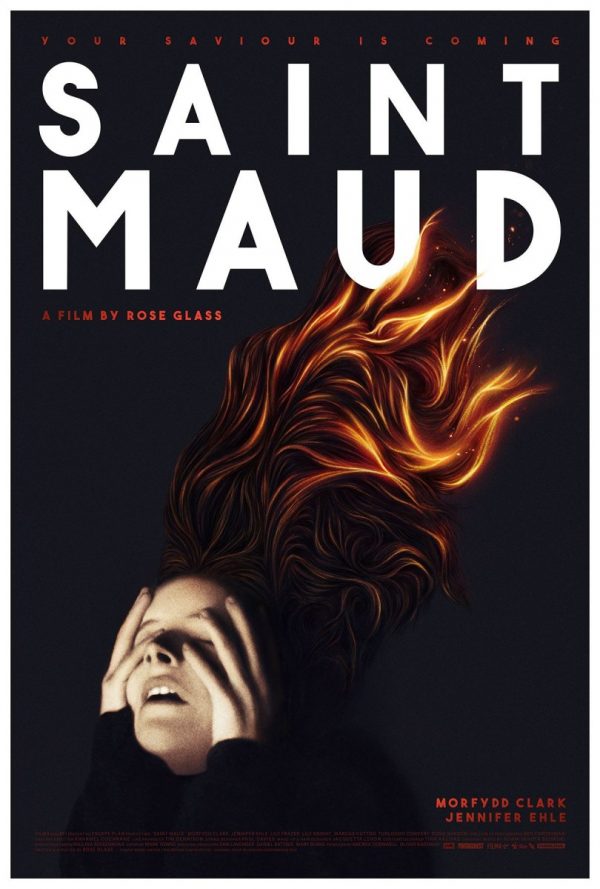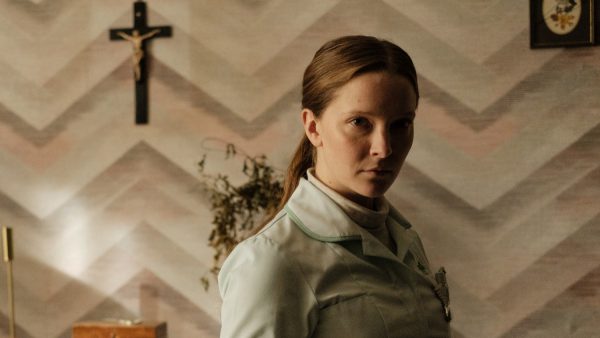Saint Maud, 2020.
Written and Directed by Rose Glass.
Starring Morfydd Clark, Jennifer Ehle, Lily Knight, Lily Frazer, Turlough Convery, Rosie Sansom, and Marcus Hutton.
SYNOPSIS:
Saint Maud follows a pious nurse who becomes dangerously obsessed with saving the soul of her dying patient.
Death is oftentimes uneventful. It’s what Jennifer Ehle’s Amanda, who is slowly dying from spinal lymphoma, tells her live-in nurse, the eponymous Saint Maud (a breakout role for Morfydd Clark so revolutionary it might as well be ripped from the Book of Revelations). Now, it would be wrong and disingenuous to say that Maud has always been a religious fanatic, as the extent of those origins are left unexplored and not necessarily relevant.
However, writer and director Rose Glass (making her feature-length debut in what is absolutely one of the best movies of the year no matter what year one actually has the opportunity to see it, further solidifying that distributor A24 is locked in when it comes to successfully picking up the most promising horror filmmakers of the modern era) does open Saint Maud with an ambiguous shot of the titular nurse shellshocked about something gone horribly wrong inside a hospital room. Maybe it’s a disturbing event she intentionally caused or a traumatic freak accident. Nevertheless, the answer will be revealed over time, but it’s clear that this moment is pivotal towards a heightened religious devotion holding dangerous consequences and an unraveling psyche.
For now, Maud is starting up a new private nursing position caring for the aforementioned Amanda, a relatively welcoming and kind woman that allows her to make herself at home in her personal bedroom, to which Maud immediately starts placing a religious cross on the wall. One day as Maud is helping Amanda with some limb stretching, the patient notices her caretaker’s Mary Magdalene necklace, prompting the two to have a respectful discussion where they don’t really see eye to eye, but a conversation where Amanda is nonetheless intrigued and eventually expresses a turn of phrase that Maud could be her savior. It is something Maud takes quite literally, trying to isolate Amanda from her few visitors; gatherings that usually involve drinking or sexual activity (Amanda appears to be bisexual which throws another misguided reason into saving someone from hypothetical damnation).
With that said, one of the biggest surprises of Saint Maud (and there’s quite a few as Rose Glass is visually imaginative and unnervingly bold when it comes to keeping viewers in the dark as to what’s next) is that the film transitions into a story about saving someone else’s soul (as the marketing promotes) to one’s own soul. The narrative takes Maud on a mental odyssey that is simultaneously tragic and darkly hilarious when it comes to splicing in a serrated-edge skewering of fanaticism and martyrdom. Not to mention, some of Maud’s chosen forms of self-inflicted punishment make for some grotesque body horror that looks pleasantly sick and has the added bonus of unsettling thematic context.
As a filmmaker, Rose Glass goes above and beyond what is expected of a first-time director, immediately propelling herself into the hierarchy of supreme modern-day horror talents such as Ari Aster and Jordan Peele. From the first frame inside of the blood-soaked hospital room to an early gross sight of liquid food bubbling and festering like body parts, it’s undeniable that Rose Glass (alongside cinematographer Ben Fordesman) is capable of backing up her religious takedown with hypnotic aesthetics. When Maud talks about feeling the touch of God inside her, it’s expressed as if she’s having some kind of faith-based orgasm, executed nowhere near as silly as that sounds. Then there’s the distorted and haunting original score from Adam Janota Bzowski that seems to take the biblical music most of us are familiar with, transforming it into something sinister and wicked, amplifying the intensity when the proceedings get extremely dark.
The more Maud’s mental state is fractured, the more the film begins to blend tones. To say the situation becomes one of deranged obsession would be an understatement, but there is entertainment and humor in that blackness. Saint Maud is not only sharp-toothed and self-aware, but it is also impeccably calculated when it comes to quick-cut juxtaposing blind faith and sanity, erupting with a final shot that can only be described as fucked up as it is sidesplittingly funny. Rose Glass brings more than fine-tuned scares; this is a tragic comedy and a cautionary tale all wrapped up into one devilishly compelling package. It’s a warped concoction of holy water and blood sacrifice, and if there’s any God in this world Rose Glass will single-handedly save cinema.
Flickering Myth Rating – Film: ★ ★ ★ ★ ★ / Movie: ★ ★ ★ ★ ★
Robert Kojder is a member of the Chicago Film Critics Association and the Flickering Myth Reviews Editor. Check here for new reviews, friend me on Facebook, follow my Twitter or Letterboxd, check out my personal non-Flickering Myth affiliated Patreon, or email me at MetalGearSolid719@gmail.com














